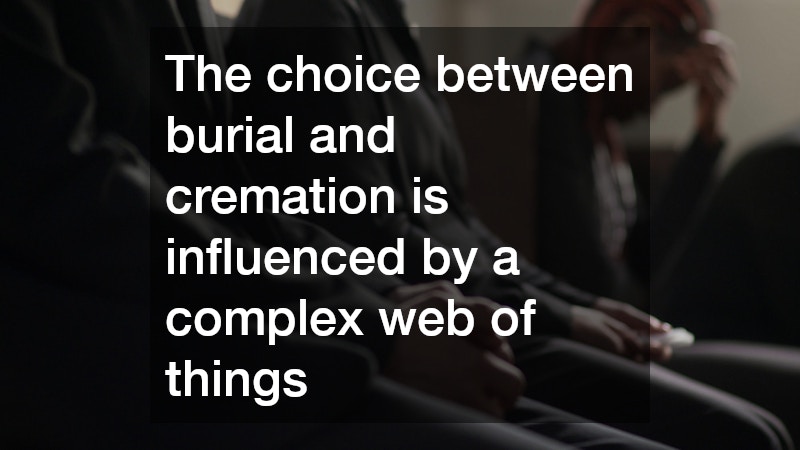
This article explores the various factors and people involved in the decision-making process regarding whether an individual will be buried or cremated. Understanding these dynamics is crucial for making informed end-of-life arrangements.
How do cultural traditions influence the choice between burial and cremation?
Religious Beliefs and Practices
Religious beliefs are a fundamental aspect of many people’s lives, often influencing significant decisions, including those related to end-of-life practices. Different religions have distinct perspectives on burial and cremation, shaping the choices their adherents make.
For instance, Christianity traditionally favors burial, echoing the burial of Jesus Christ, while Hinduism advocates for cremation as part of the liberation of the soul. These religious views provide a framework within which individuals and families make their decisions regarding burial or cremation.
Additionally, some religions may have strict guidelines or rituals that dictate specific practices, leaving less room for personal preference. Adherents often consider these religious practices as duties, ensuring continuity and respect for their spiritual traditions.
Regional and Ethnic Customs
The choice between burial and cremation is also heavily influenced by regional and ethnic customs. In many cultures, traditions are passed down through generations, impacting how and where bodies are laid to rest.
In Japan, for instance, cremation is the predominant practice, partly due to limited space for cemeteries and rooted in Buddhist customs. Similarly, many indigenous cultures have unique burial rituals, preferring methods that align with their historical and cultural narratives.
These practices often intertwine with societal values and community norms, underscoring an individual’s connection to their heritage. For many, adhering to ethnic customs reinforces identity and respects familial and cultural legacies.
What legal aspects determine burial or cremation?
Wills and Testamentary Documents
Legal documents such as wills play a critical role in determining whether an individual will be buried or cremated. These documents are the legal expression of a deceased person’s wishes and guide executors and families in carrying out those desires.
A will or testamentary document stating a specific choice between burial and cremation provides clarity and direction during what can be an emotionally taxing time. It reduces conflicts among family members, ensuring that the deceased’s preferences are honored as intended.
Moreover, having these preferences documented legally serves to protect the individual’s right to self-determination after death. In the absence of such documents, decisions may fall to family members, which can sometimes lead to disputes or misinterpretations of the deceased’s wishes.
State and Local Regulations
State and local regulations can also have a significant impact on the decision between burial and cremation. These laws ensure public health and safety standards are met within funeral practices.
Regulations may dictate where and how remains can be handled, including zoning laws for cemeteries or environmental guidelines for cremation emissions. In some regions, specific permits and documentation are required for either practice, emphasizing the regulatory role in these end-of-life arrangements.
The legal landscape can vary considerably across different locales, affecting both the feasibility and legality of certain burial or cremation options. Families and loved ones often need to navigate these regulations carefully to comply with local laws and honor the deceased’s wishes.
How do personal preferences and family influence the decision?
Personal Wishes and Pre-planning
Personal preferences and pre-planning are significant factors in determining whether someone will be buried or cremated. Many individuals make their wishes known long before passing through discussions or formal arrangements with funeral homes.
Pre-planning can alleviate stress on surviving family members, providing clear guidelines and reducing the burden of making these decisions during a time of grief. Some choose to engage in pre-paid funeral plans to lock in specific end-of-life services, emphasizing their commitment to their preferences.
Making these decisions beforehand ensures that individuals maintain control over their final rites. It also offers peace of mind, knowing that their preferences will be executed as planned, leaving a definitive guide for their loved ones to follow.
Role of Family and Next of Kin
When personal preferences are not explicitly documented, the decision between burial and cremation may fall to the family or next of kin. Family dynamics and relationships can greatly influence this process, often requiring consensus or compromise amongst loved ones.
In some cases, the absence of clear instructions can lead to disagreements, particularly if family members hold differing beliefs or opinions regarding burial or cremation. Families often aim to honor the presumed wishes of the deceased, melding personal memories and conversations in their decision-making process.
This familial influence underscores the importance of communication and documentation regarding end-of-life preferences. When family members are on the same page, there is a greater likelihood of honoring the individual’s desires and maintaining harmony during a challenging time.
The choice between burial and cremation is influenced by a complex web of cultural, legal, and personal factors. Understanding these influences is crucial for making informed decisions that are respectful of the wishes and traditions involved.
The intersection of religion, culture, law, and family dynamics plays a pivotal role in this decision-making process. By recognizing the importance of documentation and communication, individuals can ensure their end-of-life preferences are upheld, simplifying the process for their loved ones.
.

